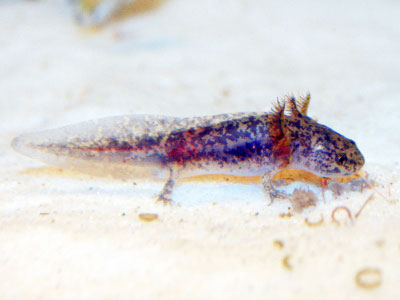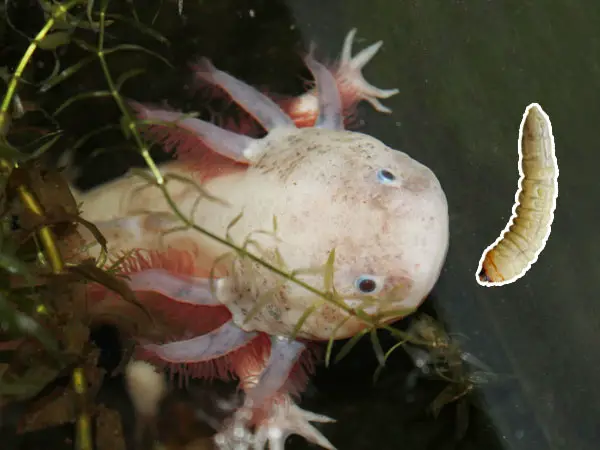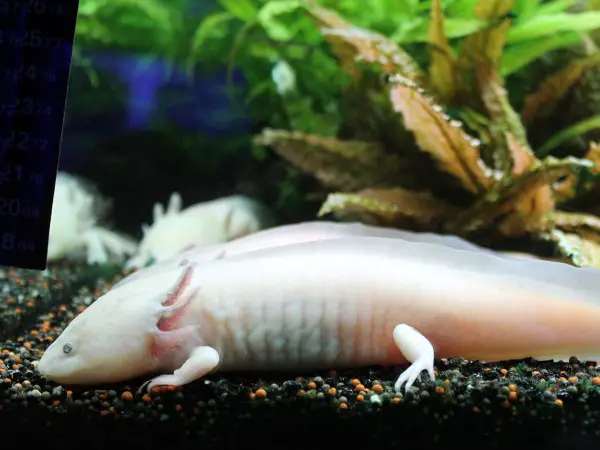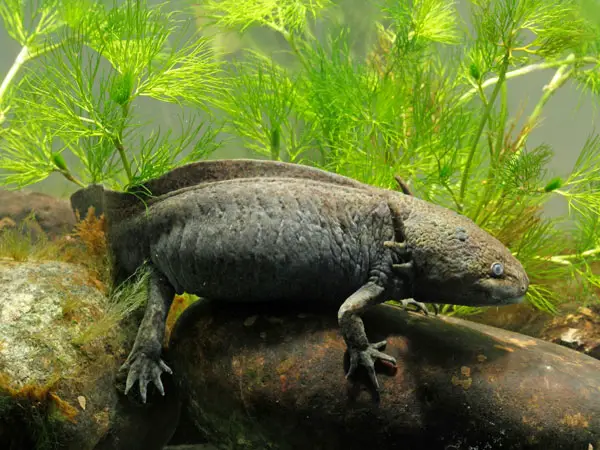Mealworms fall into the category of occasional treats when it comes to the axolotl diet. If you want to keep your pet healthy, you should only give mealworms to them after you got rid of their exoskeleton. There are plenty of other meat-based foods for them that are healthy and nutritious.
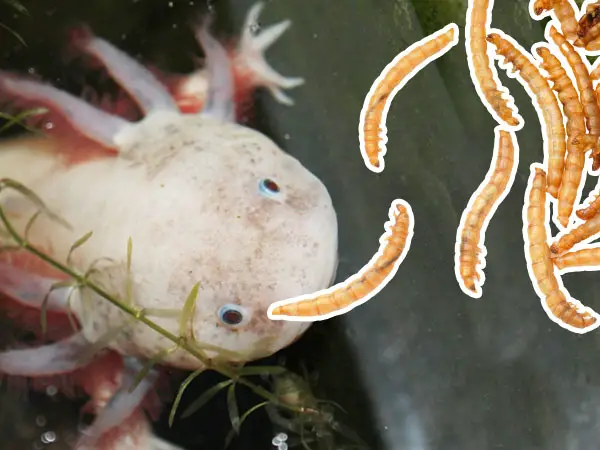
However, we don’t want to discourage you from feeding mealworms to your salamander. It is important to mix it up sometimes and introduce something new to their diet. After all, you don’t want your pet to be bored from eating the same food over and over again.
You can consider mealworms as a treat to surprise your salamander with. It is a little risky, but not if you know exactly how mealworms change their exoskeleton. Compared to superworms, mealworms are much better in terms of nutrition.
Since a healthy axolotl diet should be more complex, it definitely can’t be based only on mealworms.
How Often Can You Feed Mealworms to Axolotls?
The biggest problem with mealworms is that they have a hard exoskeleton. Besides that, their nutritional value is pretty good. The way axolotls eat is they suck in anything that is in front of them. They do this because they didn’t develop strong teeth and they don’t have many of them either.
Instead of chewing up their food, they swallow and digest it as a whole. When they eat a mealworm, the exoskeleton goes down with it and it takes a lot of time for your axolotl to get it through. Meanwhile, feeding them more mealworms would only make things harder and probably cause digestive problems.
Your axolotl can eat mealworms at any time, but only if you give him the ones that are soft. These worms frequently change their exoskeleton. When they get rid of the old exoskeleton, it takes time to develop a new one. This is when they are vulnerable and soft.
It is easy to identify mealworms that go through this so-called molting stage. Just look for the ones that are almost white, “albino” worms.
Can Mealworms Cause Impaction for Axolotls?
One of the main digestive problems caused by mealworms and superworms is impaction. If you would feed your axolotl with these two worms every day, it will quickly cause an impaction. This is due to their hard exoskeleton which takes a lot of time and energy to get through.
Besides impaction, it can cause choking as well. When this happens, your axolotl might even spit the mealworm out if it is too big to swallow. Either way, you need to stay around the aquarium and keep a close eye on your pet while he eats the mealworm.
Crushing the jaw of the mealworm is also very important. They have incredibly strong jaws compared to their size. This allows them to bite through many things including your axolotl. You can crush their jaw with a tweezer or any similar tool.
Can Axolotls Eat Dry Mealworms?
The fact that the worm doesn’t only have an exoskeleton but is also dry makes it even harder to digest. It would only cause problems if you would feed a dry mealworm to your axolotl. If you only have dry ones at your disposal, then it is better to throw them away instead of risking an impaction.
Dry mealworms are so hard to digest that you should never even try to feed them to your salamander.
Can Baby Axolotls Eat Mealworms?
Mealworms are totally out of the question when it comes to feeding baby axolotls. Those juveniles are just too fragile to digest something so hard like a mealworm. Their exoskeleton is much more dangerous than giving one to an adult axolotl, which is fine occasionally.
Axolotl babies need to eat something tiny and nutritious. You definitely don’t want to see them choke on something big like a mealworm. They are also dangerous because of their jaws but you can solve that problem easily. It is more about waiting your axolotl to become an adult before you feed it to him.
Instead, consider feeding them wax worms if you are looking for a treat besides their regular diet. Wax worms are considered as high-fat axolotl food. Since babies have a much better fat tolerance, it is not an issue for them to consume it at all.
They need plenty of fat for growing, which is why wax worms are going to help them grow faster.
Do Axolotls Eat Mealworms in the Wild?
Mealworms are not part of the wild axolotl diet by all means. Out in the wild, they are probably not going to be interested in eating them. The main reason is that they got used to other sources of food that are around them.
Their typical prey comes with much better nutritional value than a mealworm. As long as their typical diet is around them, it is highly unlikely that they are going to eat a mealworm. Of course, they are not doing it just because they are not used to it.
Things are different when you keep an axolotl as a pet. If the little guy is hungry, he is going to eat all sorts of foods. This is when you can mix it up a little bit and surprise him with a mealworm treat.
Wrapping Up
As you can see, mealworms can be pretty bad for your axolotl if you give him too many. For a baby salamander, this food can be particularly dangerous. Feeding an axolotl is something that should be supervised most of the time.
Because the way they eat their food, you should always verify whether worms or other foods indeed fit in your axolotl’s mouth. A mealworm can certainly fit into the mouth of most adult axolotls. Make sure to crush the jaw of these worms before you drop them in the tank.
Their jaws can cause serious damage if they are swallowed alive by your salamander. We can conclude that if you feed them to adult axolotls and do the preparations right, your pet is going to be fine.

